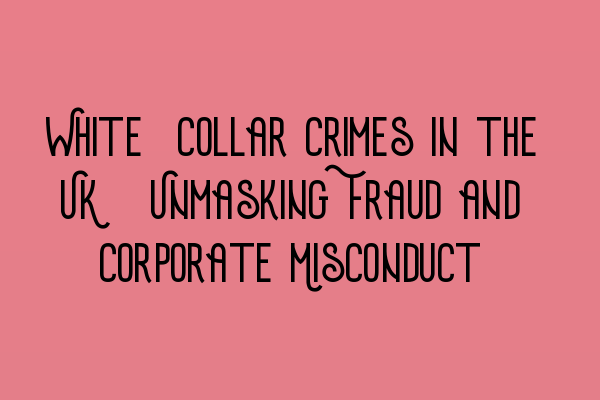White-Collar Crimes in the UK: Unmasking Fraud and Corporate Misconduct
In the ever-evolving landscape of criminal law, white-collar crimes have gained significant attention in recent years. From fraud to corporate misconduct, these offenses have major implications for individuals and businesses alike. In this blog post, we will delve into the world of white-collar crimes in the UK and shed light on the various forms of fraud and corporate misconduct that plague our society.
Understanding White-Collar Crimes
White-collar crimes, as opposed to violent offenses, are typically non-violent crimes committed by individuals in the course of their professional or business activities. These crimes often involve deceit, manipulation, and financial fraud. They may include activities such as:
- Money laundering
- Embezzlement
- Bribery
- Tax evasion
- Insider trading
- Forgery
White-collar crimes are not confined to a specific industry or sector. They can occur in any sector of the economy, from banking and finance to healthcare and technology. These offenses are usually sophisticated, taking advantage of complex systems and exploiting loopholes in the law.
Unmasking Fraud
Fraud is a common white-collar crime that encompasses a wide range of deceptive practices. It involves making false representations or promises to deceive others for personal gain. There are various types of fraud, including:
- Identity theft: where an individual’s personal information is stolen with the intent to commit fraud.
- Ponzi schemes: investment scams that promise high returns but use funds from new investors to pay off existing ones.
- Insurance fraud: making false claims to an insurance company to obtain financial benefits.
- Mortgage fraud: misrepresenting information on a mortgage application to secure a loan.
To combat fraudulent activities, it is crucial to have a robust legal system that punishes culprits and safeguards the interests of the victims. Aspiring legal professionals preparing for the Solicitors Qualifying Exam (SQE) and looking to further their understanding of white-collar crimes can benefit from resources such as SQE 1 Practice Exam Questions and SQE 1 Practice Mocks FLK1 FLK2.
Corporate Misconduct: A Threat to Trust
Corporate misconduct refers to unethical or illegal actions committed by businesses or their employees. Such acts not only harm the reputation of the company but also erode public trust. Some common forms of corporate misconduct include:
- Accounting fraud: manipulating financial statements to inflate profits or hide losses.
- Insider trading: trading securities based on undisclosed information that could impact the stock prices.
- Bribery and corruption: offering or accepting bribes to gain an unfair advantage or secure contracts.
- Intellectual property theft: stealing or misusing another company’s intellectual property for personal gain.
Businesses committing corporate misconduct not only face legal consequences but also suffer severe damage to their reputation. This can lead to financial loss, loss of customers, and potential bankruptcy.
Individuals seeking legal expertise in corporate law, including the examination of corporate misconduct, can explore SQE 2 Preparation Courses and SQE 1 Preparation Courses to enhance their knowledge and skills in this area.
Conclusion
White-collar crimes, particularly fraud and corporate misconduct, present significant challenges in the UK’s legal landscape. Understanding the various forms of these offenses is vital for legal professionals, as well as individuals seeking to safeguard themselves and their businesses. By actively addressing these issues, we can work towards a more transparent and trustworthy business environment.
